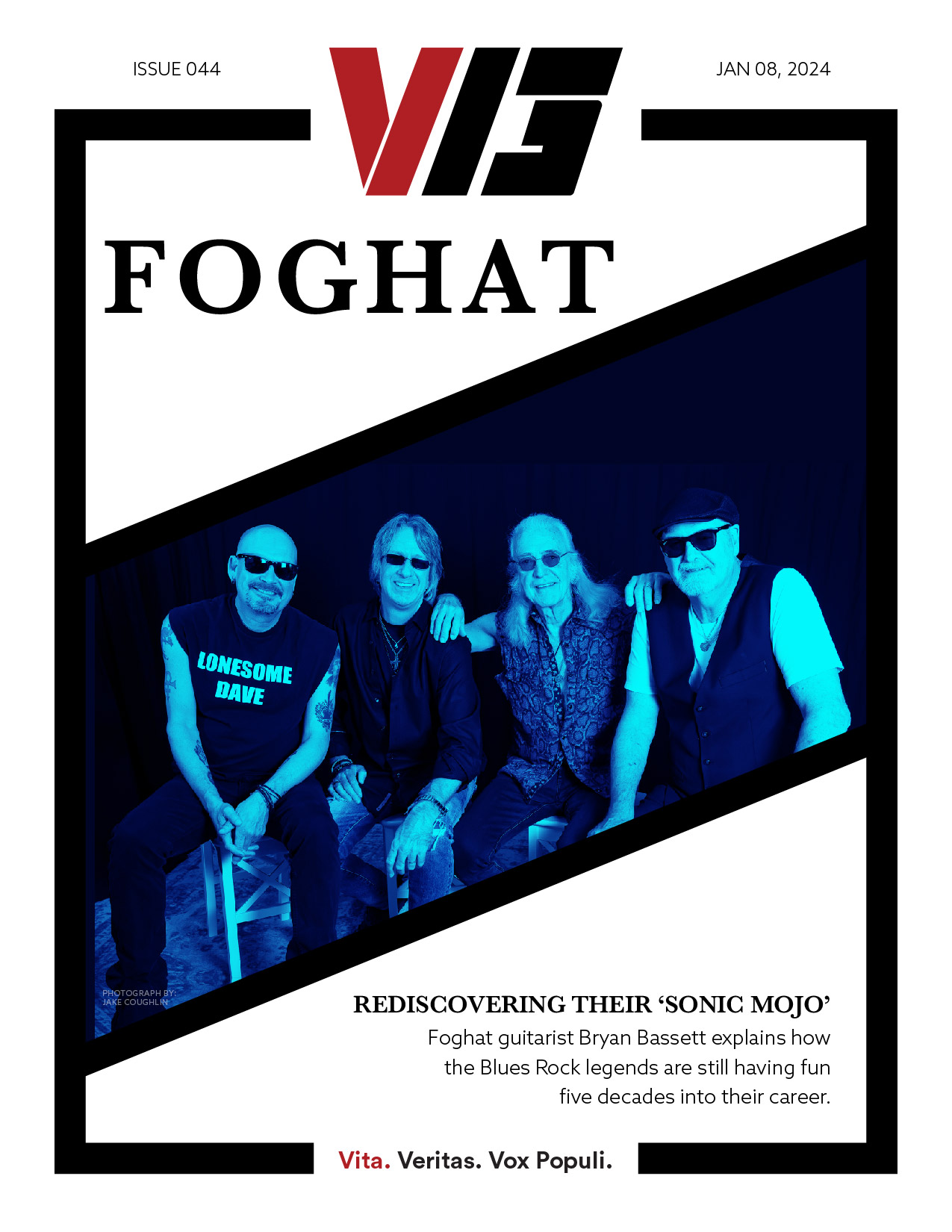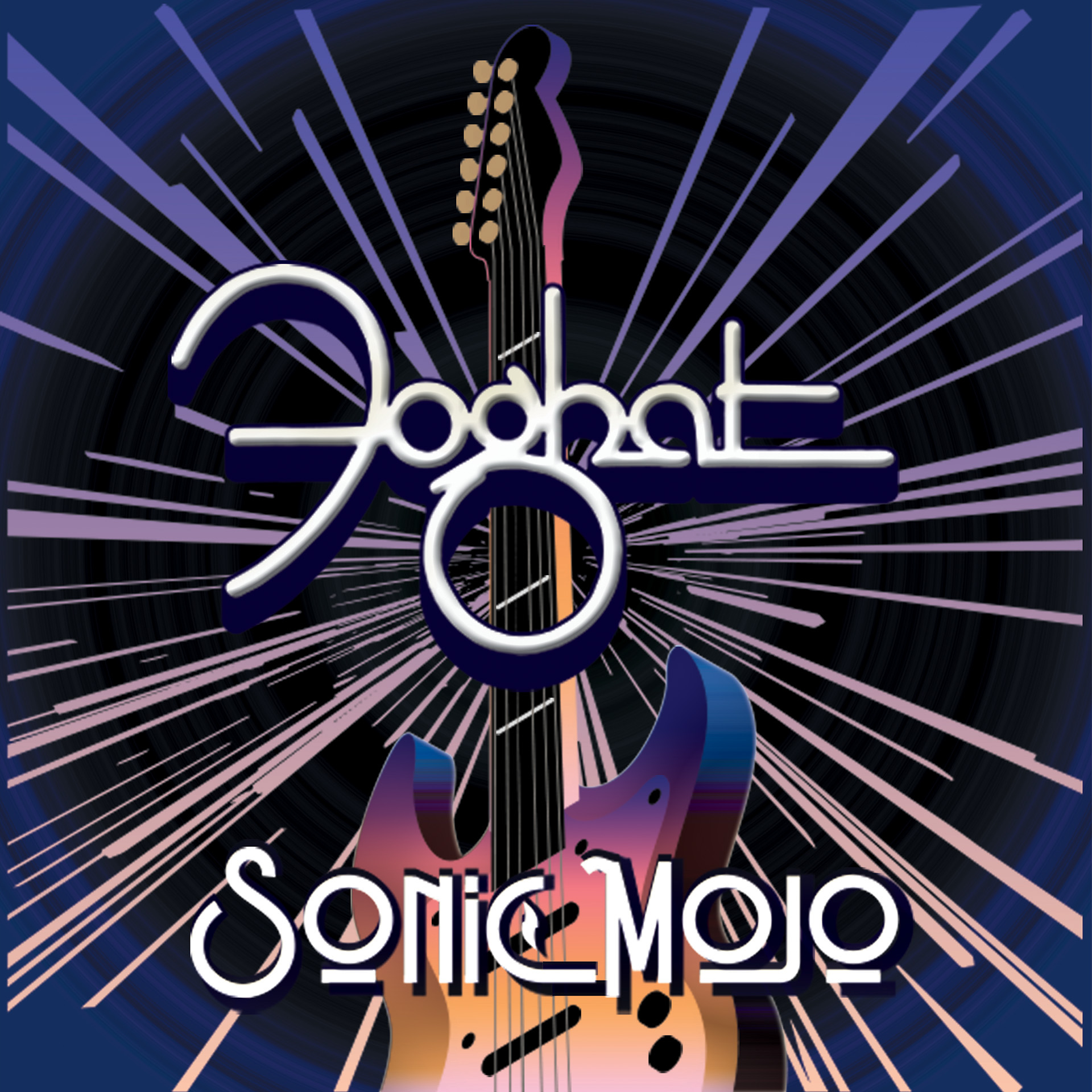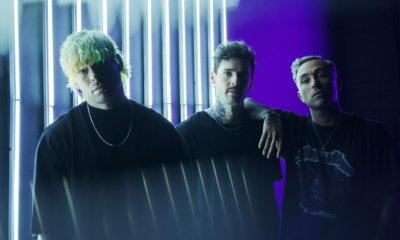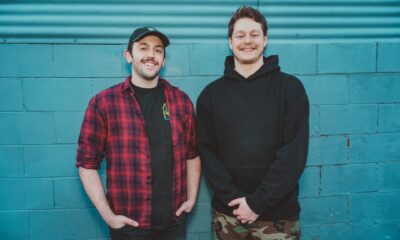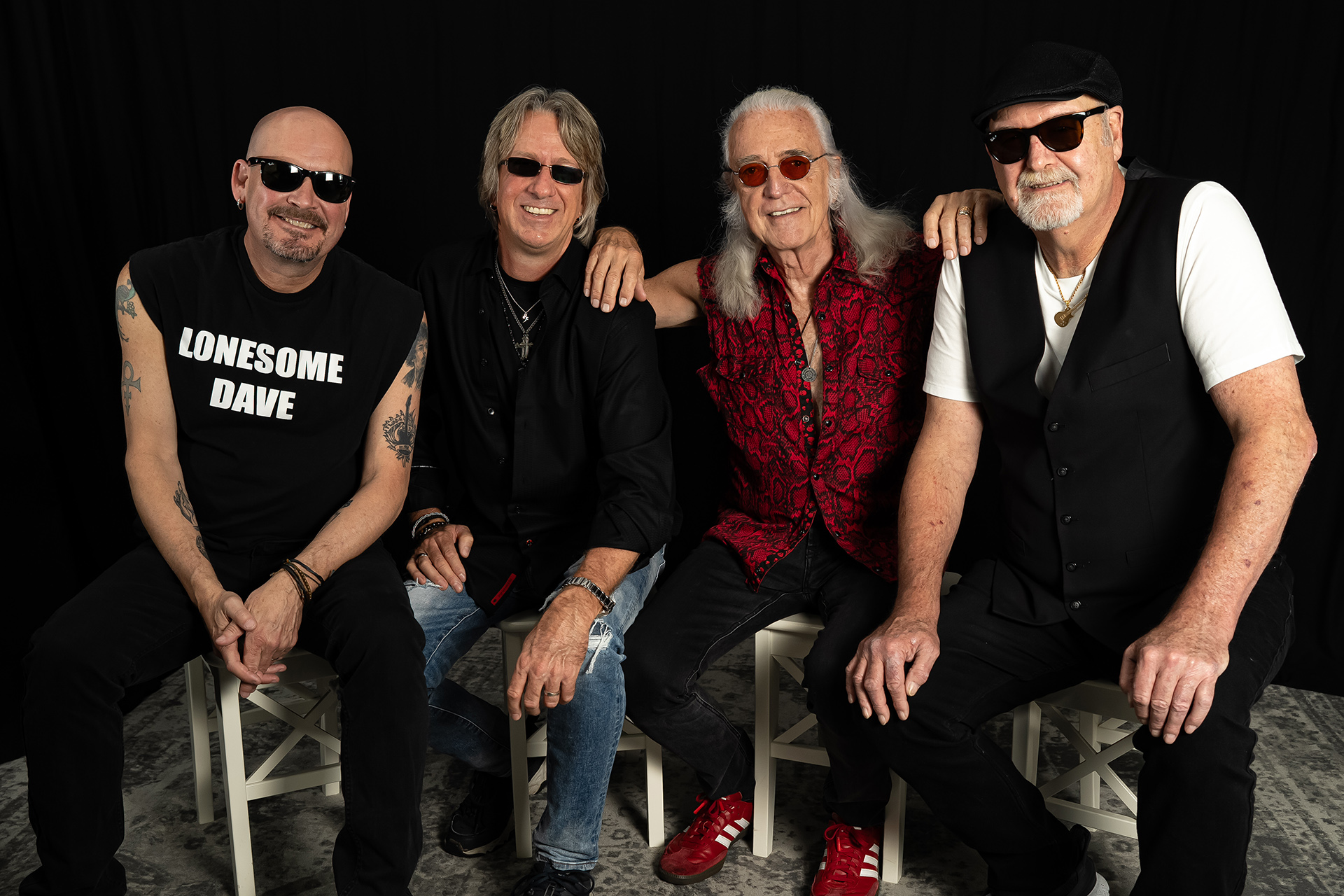
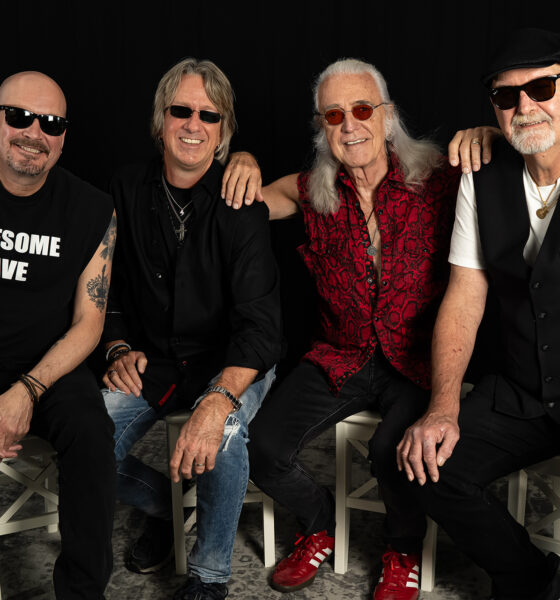
Blues
Foghat: “We always say, if you can’t have fun in a rock and roll band, you might as well just give up….“
In our latest Cover Story, Bryan Bassett, guitarist for blues rockers Foghat reveals what keeps it exciting after five decades and 17 albums.
The story of Foghat starts over fifty years ago and, along the way, has seen the various members rubbing shoulders with a veritable Who’s Who of the Rock & Blues scene. In November last year, the band released their latest album, Sonic Mojo, their first with a new vocalist and longtime friend, Scott Holt.
In our latest Cover Story, V13 spoke to guitarist Bryan Bassett about the album, the last fifty years, Foghat’s wine collection and the driver behind a career that has lasted over five decades.
Let’s talk about the new record, Sonic Mojo, which is the first one with Scott on vocals…
“It is. We met Scott some years ago when he helped with some songwriting on our last studio record about seven years ago called Under the Influence. We wrote so many songs during that session that after that record came out, we had about 12 or 13 songs left over. We created another band called Earl and the Agitators and released the CD under that name and that was the lineup that we have now. It’s sort of a secret Foghat record, but that’s where we met many years ago.
“When Charlie, our last singer, retired, Scott was down at our recording studio rehearsal hall in central Florida. We were just preparing and doing some writing for this new record then, all of a sudden, we asked Scott if he wanted to learn 30 Foghat songs and take over the spot, and here we are. That was a couple of years ago. We’ve been touring, having a great time, and now we have this new record.”
You’ve known Scott for years and although you’ve already worked on a record together, this is the first Foghat record together. Does this feel like a fresh start for Foghat?
“It does. Whenever you get a new member, particularly a new frontman, it takes on a whole new flavour. He’s very well-steeped in blues tradition and a blues rock player. It almost brings Foghat back to its initial roots, which is like the sound of the first couple of albums. The album has six originals on it and six covers. There’s always a couple of blue songs that, through the years, we’d rock it up and, do in the Foghat style, and that’s the same on this record. We have one by Chester Burnett. We have a Willie Dixon song, and we have a Chuck Berry song that we’ve worked up.
“We were blessed and pleased to have some compositions on there from Kim Simmons from the Savoy Brown Band. Kim and Roger have been friends, lifelong friends, I’ve known him for many years. He guested on our last record, Under the Influence, so I’ve known him for over a decade. He sent us some demos, three of them we liked, and we worked them up, put our two cents in there, and they’re on the record.
“Unfortunately, we wanted Kim to play on the record, but his health took for the worst, and we lost him a bit ago, but we’re blessed to have some of his last compositions on this record.”
It’s a great record. 17 albums in, we’ve talked about it feeling like a fresh start so, going forward, what are your ambitions as a band?
“I just enjoy playing… as we all do. We just like getting out on the road and playing. That’s our only mission in life to get out there and have some fun. We’re like a family. Roger and I have been together for 23 years now, continuously. Of course, I played with Lonesome Day for four years in the 80s and early 90s. That’s how I ended up in the Foghat family.
“But you know, we love getting out and performing for our fans. We’re all good friends and we like seeing each other. We like playing music, and pretty much every winter, we get together to rehearse for the new concert season, do some recording and put down any ideas that happen to come up. That’s what happened over the last couple of seasons, and we ended up with enough tracks that we thought held together to put out the new record. We hit 12 tracks that we liked.”
There’s a mix of covers, collaborations and your material on the new record. When did the writing start in earnest for this record?
“I think most of the original stuff happened in the last couple of months but the cover songs, we collect them along the way. When we do soundchecks at concerts, we always break out into some blues numbers. Scott will just pop off singing a song and, we jam on it and, if it feels good to us when we get back to the studio, we lay it down. That’s how most of the cover songs come about just us fooling around with songs that we like. Certain ones sound good playing them, and they’re different enough to not compete with the originals. We can put a spin on them. I collect them as I’m the engineer on all our stuff. I just keep a hard drive full of ideas and cover songs and, and keep working on them.
“Then, once we’ve decided on the original songs that we’re working on, we sit down around a table and work on arrangements then we go and record them. The recording takes place in a couple of weeks, the final recordings, but we have demos and tapes from over the last couple of years.”
“I just enjoy playing… as we all do. We just like getting out on the road and playing. That’s our only mission in life to get out there and have some fun. We’re like a family.”
You’ve talked about collecting covers and ideas, I can imagine over 50 years there must be some absolute gold in those archives.
“Yeah, there is. Two of the songs on there, I think it was “Mean Woman Blues” and “She’s Dynamite,” I was searching through my hard drive, and they were songs that we had done a couple of years ago, which I had forgotten about them. I opened up a folder, and those two songs were in there, already fully mixed and everything. My hard drive does have some surprises in there. I need to get in there more often and look around.”
Just to wrap up on Scott, I’m thinking along the sounds of like when a football team changes manager, there’s always that new manager buzz that goes around a team. When Scott joined the band, what did that do to you guys? Did it reinvigorate you?
“It did. It energized us. I always make the football reference as well. I’m an American Football fan of the Pittsburgh Steelers. My favourite Steelers team was in the Seventies, but I’m still a Steelers fan. The personnel has changed but our style is pretty much the same. Roger’s drumming is so unique, and that lays the foundation of all our songs, and it gives it that Foghat flavor. He is a very interesting drummer. When I was a recording engineer at Kingsnake Records, a blues label, I kept separate lists of drummers that were good backbeat drummers and ones that were good shuffle drummers and very rarely were they the same guy.
“Roger has a unique shuffle style inside his rock drumming that I think gives Foghat that boogie flavour. That’s always present in the tracks and his interest in the music he likes to hear and likes to play keeps us grounded in the Foghat sound.”
For the people you choose to collaborate with, do you have particular criteria?
“It just comes out of thin air. One of the songs on there was written by Roger’s brother, Colin Earl. He sent it to us from England. He was the pianist in Mungo Jerry, who had the great hit “In The Summertime.” so that’s Roger’s brother. He sent us a song, and it was almost country-flavoured. It’s sort of a lament about not seeing Hank Williams Snr in concert when he had the chance. Scott has a little bit of country twang to him so that’s something a little different for us on this record.
“Then we did a cover of a Chuck Berry song and that one has a little bit of a country twist to it too. It’s called “Promised Land” and it’s been covered by many artists, we just decided to play it for fun in the studio and see how it would go and we got a great track on it. Things happen like that.”
You must’ve worked with some incredible artists over the last 50 years. Is there anybody still on your bucket list that you want to work with?
“I think I’ve got to see everybody. My favourite guitarist of all time was Jeff Beck and I did see him live. I never met him though so that was a bucket list item missed. I got to see most of the guitarists that I was impressed with. I’m a guitarist who was influenced by the British Invasion blues players in particular. All the John Mayall players, Peter Green, Mick Taylor, Eric Clapton. That’s where I learned from.
“What was so interesting about that time was that the British artists taught us about our own Blues heritage because they were listening to American Blues records then rocking them up and sending them back to us. Us young guys were asking who Albert Collins or who BB King was. Who are these guys? When you’re a young guy, starting discovering your own blues roots in your own country here that was a real learning lesson.”
What was your exposure to the blues scene back then it must have been an incredible era to be part of.
“Yeah, it was. I got into it very deep. That was my first interest, and that became my playing style just from copying all those great blues guitar players or trying to play like them as a young person. I grew up in Pittsburgh, Pennsylvania, which was a great music town, particularly in the 70s when there were dozens and dozens of clubs. I had bands all through my high school years and early college. We played five nights a week, four hours a night. That was a real training ground for becoming a professional player. We were playing mostly hits off the radio. One week you’d have to learn a Journey song or you’d have to learn an Allman Brothers song or a country song or whatever. We played the hits and tried to cram some of our original music in there so that was a great basis for what I do now.”
50 years later, what keeps it fresh for you?
“Just the fun of playing. I know whenever I get on stage, I still feel like I’m 20 years old in a garage somewhere, you know, just rocking away. Yeah. I have never lost that. The thrill of the sound of a loud electric guitar. I look on the stage, and everybody has a big smile on their face. That sort of does it for me. What more could you want? That’s what we always say, ‘If you can’t have fun in a rock and roll band, you might as well just give up.’”
Absolutely. Looking back over your career, are there any real moments that have just put that smile on your face?
“Yeah, there’s several. My first band was out of the Tri-state area. I was in Wild Cherry. We had a hit song, ‘Play That Funky Music, White Boy.’ That was my first hit record when I was 21. I’m the guitar player on that and did three albums with ’em. What was great about it was that we got to tour on the strength of that hit with all the great R&B artists of the day.
“We did some shows on Jackson 5’s last tour. Stevie Wonder, Earth, Wind & Fire, Commodores, Isley Brothers… We played with all those guys and met them. There were a couple of brushes with greatness there. Michael Jackson actually introduced me to Stevie Wonder. That’s a pretty good brush-with-greatness moment there. What was cool about that period and when I was in that band was that I had turned down a college scholarship to go live in a condemned building in Ohio to be in a band. I left after 1 year of college and went to live in a condemned office building then I had success with Wild Cherry a couple of years later so my parents got to be in attendance at the local arena it was nice for my parents to be in attendance and see that I didn’t make an incredibly horrible mistake.
“Everybody’s parents have gone through that conversation. It’s like “Oh, okay, you’re leaving college and going off with a bunch of these musicians. All right, we’ll see how that works out.” They were very encouraging. I must admit I expected them to blow up, but they didn’t.”
Did you have musical parents?
“My mom was musical. She sang and played piano around the house and family parties and stuff. Nothing professional. My dad was a truck driver all his life, but I think he was a frustrated writer. That led me to check out my artistic or creative avenues before I dove into the real-world thing. I think he was happy to see how it went… along with me. I had a lot of great experiences like when I joined Molly Hatchet. I was with them for seven years and did several albums. I enjoyed my time touring around. We were signed to a German record label, SPV, so I got to meet a lot of musicians like the guys in Nazareth, they’re always fun to play with, the guys in Saxon also. A lot of the guys that were recording were at the same studio we used over there.
“So, that’s the most fun I have when I’m on the road. The thing I enjoy is just meeting other musicians, people I admire and I’ve looked up to, I got the chance to meet them. We played with ZZ Top not too long ago. I got to meet Billy Gibbons and that’s one of the best parts of what we do is playing with other bands.”
“My dad was a truck driver all his life, but I think he was a frustrated writer. That led me to check out my artistic or creative avenues…”
You’ve talked about obviously producing the records. Comparing now to back then, it’s a very different process now as technology’s moved on a lot. How do you keep that organic sound? A lot of the new bands have come out, and it’s all very clinical.
“I’m not going to use the word cold, but I worked for many years as an engineer/producer for a company called Kingsnake Records, and we made Blues records for indie labels. We did almost all blues artists. This is pre-CD. When I started, it was two-inch tape, very organic recording. It’s almost a documentary-style recording. From my engineering standpoint, it wasn’t overproduced.
“It was trying to capture the artist in the room and how it sounded and try to get that real feeling across to the people who were listening to the record. I’ve always kept that mindset, but that’s my way of recording. I like the natural sounds of people playing. I work with a lot of other artists as an engineer on more modern-sounding things. I’m very good at auto-tune if I need it. I don’t use it on our records. I’m very good at editing. I always think, even though I’m recording digitally now, no engineer that I know would go take an analogue recording of the old time over what’s happening now because you can’t incorporate analogue elements into digital recording. It’s just a matter of approach and I approach my recordings, particularly of our band, I want it to be real. I want real performances and real emotion.
“I don’t try to overproduce it. I wanted the songs, particularly on this record, to be able to transfer to the stage for performance. So, I didn’t put a thousand guitars on there. There might be a few guitar overdubs but, generally, the songs, are all transferring to the stage well, and people are responding to it. That’s the music I like in general.”
Do you think that fans wouldn’t like it if it was overproduced?
“It’s not our style. Like I said, I work with other artists that are more modern, and I enjoy that as well. An old friend of mine that used to play in Hall and Oates, but was also a band called Novo Combo with Michael Shrieve, I’m doing some engineering for them, and it’s a different style of engineering. I’m using more of the digital plugins and possibilities and editing and stuff like that that I don’t necessarily use on a Foghat record. I consider recording our band like almost recording a blues band.”
We’ve talked about the production side of it changing, but over the years, the music industry has changed a lot as well. Some good changes, some bad, and some let’s not talk about. What’s the most important lesson you’ve learned in the music industry over the years?
“As you say, it’s been a double-edged sword, digital technology and all its forms, all the way from being able to make endless copies. As a record company warned decades ago, it was going to destroy the industry. Well, it didn’t quite destroy it, but it certainly mutilated it into a certain… changed it into something entirely different. Streaming, for example, really affects the effect of the income of artists, so I always recommend that if you’re a fan of a band, buy their CD or buy their hard product, buy their shirt, listen, and then stream them all you want. It’s not so much a money-making thing, recording anymore, at least at most levels. Of course, top of the pyramid, everybody’s making good money but, for most work-a-day musicians, recording is almost more promotional than it is money-making. It’s more to bring people out to your live performances, and that’s where the lion’s share of income is for so many bands.
“But then there’s also the library of the world of music at your fingertips. That’s brilliant. You can do a deep dive on any artist and between videos on YouTube and audio on every platform, you can listen to the history of music at your, you know, at your leisure. I mean, when I was growing up, I had a couple of really great bands, we couldn’t get a record deal. No record company, no record, you couldn’t afford to do it yourself. Back in the vinyl days, you had to have a company promote you and get you on the radio. it wasn’t the internet back then. It was all about radio and that’s entirely changed throughout my career.”
Just to wrap up, let’s talk about the wine collection…
“It’s an endeavour of Roger and Linda, his wife, Linda’s also our manager. We met a guy named Steve Rasmussen who would go around to all these boutique vineyards out of California and bottle small runs of high-quality wine. He was a Foghat fan and came to a show and talked to us about doing a Foghat-labelled wine.
“He would have these all vineyards that would have leftover stock every season. They’d have to make very new produce coming in. We didn’t do thousands and thousands of cases, but we did do some high-quality central California wines. Mostly, we did two reds and a white for several years. It’s more of a hobby than anything, but it’s fun. We like to drink it. It’s a great wine. We had a great Pinot Noir a couple of years ago.
“It’s so funny trying to ship alcohol around the country. Sometimes it works, sometimes it doesn’t, depending on what state you’re in. Same with selling it. It’s available online here, and we have a couple of warehouses across the country that will get it to you whenever you want it.
“It’s just a fun thing to do, you know, but it’s mostly Roger and Linda. They would go out there and go to the vineyards picking the grapes and then get back there again when they were doing bottling. They would get into it; my end point was mostly just taste testing. The best part of it. The business side was all down to Linda.”
Great, thanks for your time and good luck with the record. It’s been seven years since the last record. Have you got any message for fans who have been waiting for this record?
“Just please pick it up and take a listen to it. We just hope that you like what we’re doing still. Come out and see a show whenever you can and have a good time rocking out with us.”
-

 Alternative/Rock2 weeks ago
Alternative/Rock2 weeks agoThe Warning Shake the Foundations of a Sold-Out Leeds Stylus [Photos]
-

 Alternative/Rock4 days ago
Alternative/Rock4 days agoThe Cruel Knives Headline Top Night of British Rock at Manchester’s The Lodge [Photos]
-

 Hip-Hop/Rap6 hours ago
Hip-Hop/Rap6 hours agoFormz: “I was always the confident kid in school, with a passion for entertaining and being the centre of attention..”
-

 Alternative/Rock4 days ago
Alternative/Rock4 days agoThe V13 Fix #012 w/ Dååth, Unearthly Rites, maybeshewill and more
-

 Alternative/Rock2 weeks ago
Alternative/Rock2 weeks agoThe V13 Fix #011 w/ Microwave, Full Of Hell, Cold Years and more
-

 Indie2 weeks ago
Indie2 weeks agoDeadset Premiere Music Video for Addiction-Inspired “Heavy Eyes” Single
-
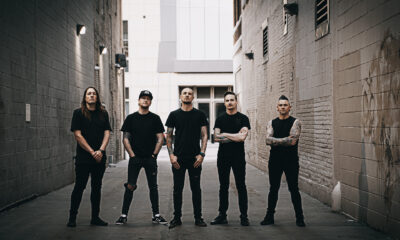
 Interviews1 day ago
Interviews1 day agoKill The Lights Michael ‘Moose’ Thomas Talks Success, International Bandmates and more
-

 Folk2 weeks ago
Folk2 weeks agoKatherine Perkins Strikes the Right Tone with Her “Hold On” Music Video Premiere

